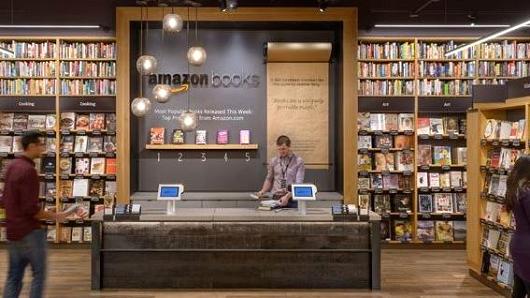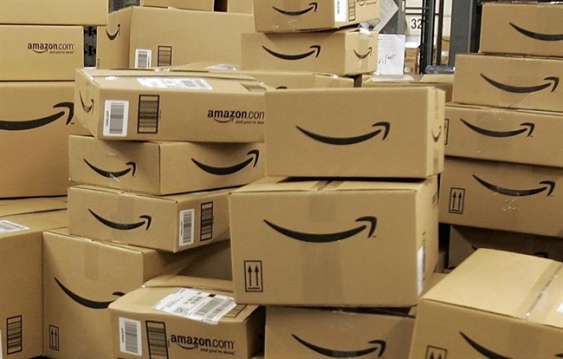|
Amazon is generally considered to be responsible for the demise of hundreds of brick and mortar bookstores. The mega-retailer helped drive dozens of independent bookstores into bankruptcy, and pushed the former chain Borders into oblivion. Then, last fall, Amazon surprised many by opening a physical bookstore in its home town Seattle. The bookstore is built on a different model than large bookstores of the past, such as Barnes and Noble, Borders, or Books A Million. With most chain bookstores, books are stocked by the publisher's demands. These demands are issued by the so-called "big five" traditional publishers such as HarperCollins and Houghton Mifflin. The publishers sign an author, and release a set number of books to the stores. A new author, for example, might get offered a 10,000 book run. All of the bookstores would be sent copies of the novel, totalling 10,000 copies, and the author hopes they sell. The bookstores are given a time limit, usually about three weeks, and then any books that are unsold are destroyed and sent back to the publisher. If the author had an advance, he can be docked the cost of returned books. If he didn't have an advance, he still knows he likely won't get another contract if the books sold poorly. With this model, the big five establish what books are in stores, and all books are either "make it or break it" novels for an author. If you don't succeed big, you fail, and there's little room in between. However, all of that might change. On Tuesday Feb 2nd, the announcement was released that Amazon will open HUNDREDS of physical bookstores. CNBC shared the announcement, citing up to 400 brick and mortar stores to open. Amazon retracted the statement shortly after, and while not denying that it plans to increase its number of physical stores, it is backing away from specific numbers. Only TWO days after the announcement originally aired, Barnes and Noble stocks had plummeted 14%, showing the real fear of the mega-retailer's possible entry into the chain bookstore venue.
If Amazon does open hundreds of physical bookstores, the entire publishing industry could change. Amazon has publicly stated that its physical bookstore's selections are based entirely off of sales and ratings of books on Amazon.com. A quick look through the online store and many of the bestsellers are NOT published by the big five publishers. Many bestsellers are self-published books offered at Amazon only. If these then become the books seen in physical bookstore chains, how will the big five respond? In 2012, Houghton Mifflin filed for bankruptcy to help erase debt. The big publishers are facing increasing financial hardhips, and with the oncoming Amazon phyiscal chain, they NEED to shift their focus if they hope to survive. One model that may gain in popularity is Print on Demand, or POD. Many books, including The Scythe Wielder's Secret, are currently offered as POD, and since books are only printed when they're ordered, there are far fewer financial risks. If a national bookstore chain is filled with POD books, will old model publishers even be relevant? Could the big five focus on print on demand publishing, instead of enormous gamble-based runs? Could the older publishers focus on marketing, or other mechanisms not necessarily available to smaller presses, so that they still have something unique to offer? Or will the older publishers crumble, like Borders did? The only thing certain in the publishing industry is that the business is changing rapidly, and the old rules don't necessarily work any more.
5 Comments
Interesting take and you are so right about the publishing industry constantly changing. We never know what or where but it does happen, on an almost daily basis. I wonder how Amazon is going to decide where to open those bookstores. I'm not sure who will benefit the most - obviously the top sellers in their genres (and yay for the indie or self-published folks who have accomplished that) and hopefully knock the big publishers on their butts and make them rethink their entire industry. We can only hope.
Reply
2/15/2016 05:58:27 pm
Elysabeth,
Reply
4/8/2021 05:10:47 pm
I agree that the future of bookstores and books has changed a lot in the recent times and the growing importance of print on demand services. Thank you for spreading this knowledge with us. It was truly a pleasure to read your article. Thank you.
Reply
Leave a Reply. |
Archives
April 2024
Older postsCategories
All
|


 RSS Feed
RSS Feed